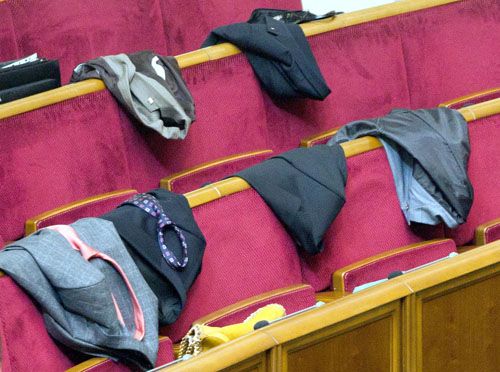Parliament must be unblocked
Vadym Karasiov: If this situation continues, those in power will say Opposition is driving Ukraine off European integration course
February 5, 2013, a regular session of the Verkhovna Rada was adjourned after Opposition members seized the rostrum, after failing to come to terms with the ruling party over the personal vote procedures. Another Verkhovna Rada brawl ensued, serving as further proof that Ukraine has an operetta parliament, considering that any MP in a civilized country knows only too well that any problem should be dealt with proceeding from current legislation.
Opposition blocking the VR rostrum. Is this tactic effective? Is the VR Opposition effective? More on this in the following interview with Vadym KARASIOV, political analyst, director, Institute of Global Strategies.
Mr. Karasiov, do you believe that blocking parliament will benefit the Opposition in any way?
“None of the [ruling] Party of Regions members offered resistance as the Opposition MPs were occupying the rostrum. Why? Because the Party of Regions does not have the right kind of technologies to secure the personal vote procedures, so they’re in no hurry to start another VR session; they aren’t prepared to start working. They know the Opposition won’t be able to block access to the VR rostrum for long, nothing to do with physical or red-letter day reasons, but because Stefan Fuele, European Commissioner for Enlargement and European Neighborhood Policy, is supposed to take the floor on Friday. Also, because there is a bill relating to Ukraine’s European integration, something the VR wants to have up its sleeve before the Ukraine-EU summit slated for this February.
“Stefan Fuele’s appearance at the Verkhovna Rada, passing an important foreign-policy-strategy bill, having regular plenary sessions would surely play into the Opposition’s hand. With Opposition members blocking the Ukrainian parliament, the pattern looks different. How long will they bar access to the VR rostrum? In the end, the current administration will say that the Opposition was blocking Ukraine’s European integration. If those ‘upstairs’ continue to quietly sabotage Ukraine’s European integration course, they will always be able to accuse the Opposition of doing just that. If they are really determined to get prepared for the Ukraine-EU summit and stop playing games with Putin and his Customs Union, they can easily convince their European partners that Ukraine’s executive branch (blamed for numerous malfunctions by Ukrainian public and EU analysts) is the most consistent proponent of European integration. The big question is whether this blocking of the Ukrainian parliament is really effective, considering Fuele’s appearance [on Friday] and [the necessity of] passing a bill on Ukraine’s European integration? The ruling faction is biding its time, of course. The Opposition will have to lift the siege and make sure this coming Friday will mark the triumph of the Ukrainian parliament and the triumph of adopting the European integration course.”
What about the latest political talk shows on Ukraine’s major Inter and First National channels – I mean the Shcherban and Gongadze cases?
“Apart from today’s media and political rhetoric, the emphasis on the Shcherban and Gongadze cases in such talk shows is proof that Ukraine isn’t completely past the devastating gang-war-street-shoot-out-grab-and-run 1990s. Such bad habits have to be discussed and banned during such talk shows. Ukraine is obviously unable to pass the early post-Soviet phase. Our media and politicians keep focusing on the deeds of days of other years. A bad sign. Ukraine is getting itself in a historical cul-de-sac. Of course, one has to consider political circumstances. The Shcherban and Gongadze cases are major milestones in the history of the Ukrainian oligarchic ruling class that has thrived for the past twenty years, surviving the Orange Revolution, reforms, parliamentary and presidential campaigns, you name it. Any political leader who tries to alter the pattern of this impulsive ruling class and get it under control – to establish an effective authoritarian regime – will eventually find it necessary to bring forth old criminal cases that involve politics. This politician will have to act that way to deal a crushing blow to the possible territorial-oligarchic Fronde, ridding him/her of political rivals (in this case Yulia Tymoshenko). This politician will have to arrange for every such big-time case to be accompanied by social, structural, political, and moral problems, followed by polls and expert findings that will differ from those made at the turn of the 21st century. This political leader will declare that his country must learn from the mistakes made in 1990-2000 and keep moving in the direction of Europe, the way it did in 2010. For all I know, such talk shows don’t measure up.”
What about the court ruling in the Pukach case, his words about Kuchma and Lytvyn who should be in the dock with him?
“The sentence Pukach received was one meant for the executor [executioner], not for those who had ordered it at the time. Ukraine is still back to that period of innuendos, cynicism, and lies. This gives rise to all kinds of assumptions and grim allegations. The Pukach case is officially closed. The Gongadze case remains to be closed. There are lots of legal pitfalls and innuendos, for the whole matter seems to be resolved after the murderer’s arrest and trial.
“Pukach’s statement concerning Kuchma and Lytvyn could cause further investigation into the Gongadze case, yet the overall official feeling is of heaving a breath of relief: here is the murderer, he has been tried and received life sentence; the case is closed and left in the archives. My gut feeling says the Gongadze case remains to be solved.”






